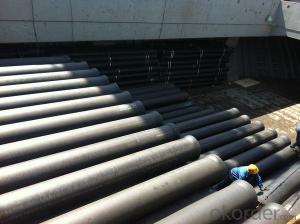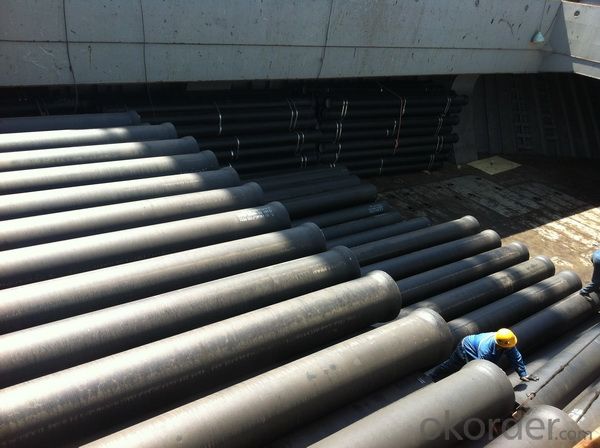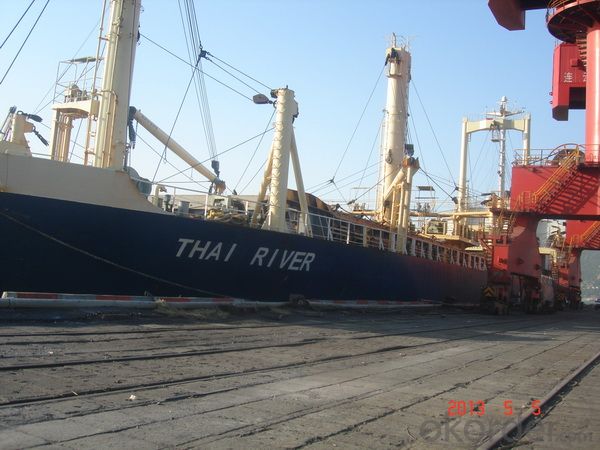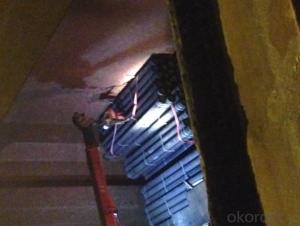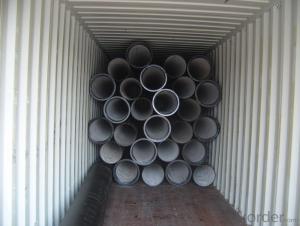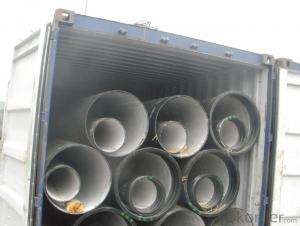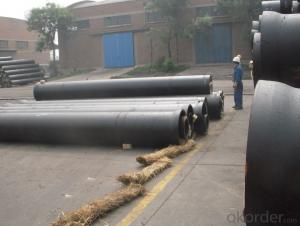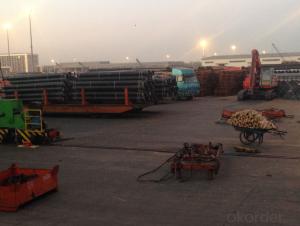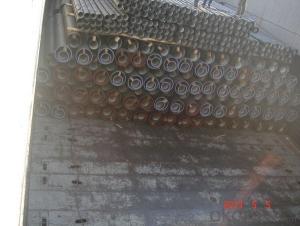DUCTILE IRON PIPES AND PIPE FITTINGS C CLASS DN100
- Loading Port:
- Tianjin
- Payment Terms:
- TT OR LC
- Min Order Qty:
- 22 pc
- Supply Capability:
- 3000 pc/month
OKorder Service Pledge
OKorder Financial Service
You Might Also Like
Material : Ductile Cast Iron
Size Range : DN 80mm to DN 2000mm
Unit Effective Length : 6m or 5.7m
Manufacture Standard: ISO 2531:1998/ EN 545:2006/EN 598:2007
Annual capacity : 200,000 tons
Coating Exterior: Zinc 130g/m2 according to ISO 8179-1 and bitumen coating 70 microns.
Cement Interior: Portland Cement/ High Alumina Cement/ Sulphate Resisting Cement Lining according to ISO 4179
Special requirements on external coating and internal lining can be applied
We also provide accessories such as SBR/EPDM rubber gaskets, lubricant paste, pipe caps, PE sleeves, etc.
Additional Parts:
Each pipe is strictly inspected according to related standard to ensure permanently high performance.
Easy Installation at site and service free for life
Long Service Lifespan
Quotation will arrive you within 24hours once we get your inquiry.
We guarantee offering you a competitive price.
A copy of original inspection reports of pipes will be offered after shipment.
Photos of loading process will be sent to the customer after shipment effect.
We will follow-up the delivery progress after shipment effect and update to the customer on weekly basis.
- Q: How do ductile iron pipes perform in high-temperature water applications?
- Ductile iron pipes are known for their strength, durability, and excellent mechanical properties, which make them suitable for a wide range of applications. However, when it comes to high-temperature water applications, certain considerations need to be taken into account. Ductile iron pipes generally perform well in high-temperature water applications up to a certain threshold. The exact temperature limit depends on the specific grade of ductile iron used and the duration of exposure to high temperatures. In general, ductile iron pipes can withstand temperatures up to 350-400 degrees Fahrenheit for short periods without significant degradation or loss of strength. However, it is important to note that prolonged exposure to high temperatures can have detrimental effects on ductile iron pipes. At elevated temperatures, ductile iron pipes may experience a phenomenon called thermal degradation, which can lead to reduced mechanical properties, increased brittleness, and even cracking or failure over time. To mitigate the risks associated with high-temperature water applications, several measures can be taken. Firstly, selecting the appropriate grade of ductile iron with a higher temperature tolerance can enhance the pipe's performance. Secondly, implementing proper insulation or heat shielding measures can help minimize the direct heat transfer to the pipes, thereby reducing the potential for thermal degradation. Additionally, regular monitoring and maintenance of ductile iron pipes in high-temperature water applications are crucial to identify any signs of degradation or damage early on and take appropriate remedial actions to prevent failure. In summary, while ductile iron pipes can generally perform well in high-temperature water applications, it is important to carefully consider the specific conditions and requirements of the application to ensure their long-term performance and integrity.
- Q: What is the expected joint tightness for ductile iron pipes?
- Ductile iron pipes are renowned for their exceptional strength and durability, which grants them remarkable resistance against leaks and joint failures. Consequently, the joints in these pipes are meticulously designed to establish a secure and tight connection, effectively minimizing any potential water or fluid loss. In the realm of ductile iron pipes, a variety of joint types are commonly employed. These encompass mechanical joints, restrained joints, and push-on joints. Each of these joint types is uniquely crafted to deliver a reliable seal, effectively averting any leakage. Mechanical joints rely on a combination of a mechanical gland and rubber gaskets to forge an airtight seal. The assembly of these joints necessitates a specific level of torque to ensure proper compression and sealing. On the other hand, restrained joints are specifically tailored to withstand external forces, such as soil movement or pressure, while simultaneously preserving their tightness. To achieve this, these joints often incorporate a mechanical restraint system, such as a key-locking mechanism, thereby preventing joint separation. Meanwhile, push-on joints represent the most straightforward option to install, as they rely on a compressed rubber gasket that effectively seals the pipes when pushed together. These joints are most commonly employed in smaller diameter pipes, where external forces exerted on them are minimal. All in all, ductile iron pipes are expected to exhibit a high level of joint tightness, ensuring consistent and leak-free performance across a wide array of applications, including water distribution, wastewater systems, and industrial piping networks.
- Q: How are ductile iron pipes connected?
- There are several methods commonly used to connect ductile iron pipes, including flanged joints, mechanical joints, and push-on joints. Flanged joints involve connecting two sections of pipe by using a flanged coupling. The pipe ends have flanges that are securely bolted together, creating a connection that is both strong and leak-proof. This method is often used for pipes with larger diameters or in situations where a rigid joint is necessary. Mechanical joints use a mechanical joint gland and rubber gasket to create a seal that is watertight. The ends of the pipes are inserted into the gland, and then bolts are tightened to compress the gasket, ensuring a reliable connection. This method is frequently employed in water distribution systems because it is flexible and easy to install. Push-on joints utilize a rubber gasket to create a tight seal between sections of pipe. The gasket is placed in a groove on one end of a pipe, and then the other pipe is pushed onto it, resulting in a compression seal. This method is quick and straightforward, making it suitable for a variety of applications, such as sewer systems and underground piping. Ultimately, the choice of connection method for ductile iron pipes depends on factors such as pipe diameter, application requirements, and installation conditions. It is of utmost importance to adhere to the manufacturer's recommendations and industry standards to ensure proper installation and dependable performance.
- Q: Can ductile iron pipe be used for compressed air systems?
- Indeed, compressed air systems can make use of ductile iron pipe. Ductile iron pipe, renowned for its robustness, endurance, and crack resistance, proves suitable for numerous applications, including compressed air systems. It possesses the capability to endure high pressures and exhibits a lesser tendency to corrode or rust in comparison to alternative materials. Nonetheless, it becomes crucial to guarantee that the ductile iron pipe is adequately sized and installed to accommodate the precise demands of the compressed air system. Furthermore, conducting regular maintenance and inspections becomes imperative to avert any potential problems or damages.
- Q: What are the typical joint sealing requirements for ductile iron pipes?
- The typical joint sealing requirements for ductile iron pipes include the use of rubber gaskets or mechanical joints. Rubber gaskets are commonly used for joint sealing in ductile iron pipes as they provide a reliable and flexible seal. These gaskets are typically made of synthetic rubber materials that are resistant to water, chemicals, and other environmental factors. Mechanical joints, on the other hand, are another common method of joint sealing in ductile iron pipes. These joints consist of a mechanical device that connects the pipes together and provides a watertight seal. Mechanical joints are typically designed to allow for some movement and flexibility, which is especially important in areas where ground movement or settlement may occur. In addition to using rubber gaskets or mechanical joints, it is also important to properly clean and prepare the pipe surfaces before making the joint. This may involve removing any dirt, debris, or old joint material from the pipe ends to ensure a proper seal. The joint should then be assembled according to the manufacturer's instructions, ensuring that the gasket or mechanical joint is correctly positioned and tightened to the recommended torque. Overall, the typical joint sealing requirements for ductile iron pipes involve the use of rubber gaskets or mechanical joints, proper cleaning and preparation of the pipe ends, and following the manufacturer's instructions for assembly. These requirements are essential for ensuring a watertight and durable joint that can withstand the pressures and environmental conditions commonly encountered in ductile iron pipe systems.
- Q: How do ductile iron pipes handle ground settlement near construction foundations?
- Ductile iron pipes are known for their ability to handle ground settlement near construction foundations effectively. Due to their flexible nature, these pipes can withstand ground movement without experiencing severe damage or failure. When the ground settles near construction foundations, it can cause shifts in soil, which in turn can exert pressure on the surrounding infrastructure. Ductile iron pipes have the advantage of being able to absorb and distribute this pressure, minimizing the risk of pipe breakage or deformation. One key factor that contributes to the resilience of ductile iron pipes is their high tensile strength. This strength allows the pipes to maintain their structural integrity even under significant external forces. As a result, they can withstand ground settlement without experiencing fractures or cracks. Furthermore, ductile iron pipes also have a high degree of flexibility. This flexibility enables them to adapt to minor ground movements and accommodate shifts in soil without compromising their functionality. The pipes can bend slightly without breaking or causing leaks, ensuring continuous flow of fluids and preventing any disruptions to the construction project. In addition, ductile iron pipes are often installed with proper bedding and backfill materials. This ensures that the pipes have a stable and secure foundation, reducing the risk of movement and settlement. The use of these materials also helps distribute the load exerted on the pipes more evenly, further enhancing their ability to handle ground settlement. Overall, ductile iron pipes are an excellent choice for construction projects where ground settlement is a concern. Their strength, flexibility, and proper installation techniques allow them to effectively handle ground movement near construction foundations, providing reliable and long-lasting infrastructure.
- Q: What are the different joint types available for ductile iron pipes?
- There are several different joint types available for ductile iron pipes. These joints play a crucial role in ensuring the integrity and reliability of the pipeline system. 1. Push-on Joint: This is the most common type of joint used for ductile iron pipes. It involves a rubber gasket that is placed inside the bell end of the pipe, and the spigot end is then pushed into the bell, creating a tight seal. This joint is quick and easy to assemble and provides excellent resistance to soil movement and water pressure. 2. Mechanical Joint: This joint involves a gland and follower that are tightened around the spigot end of the pipe using bolts and nuts. The mechanical joint provides a strong and durable connection and is commonly used for larger diameter pipes or in applications where higher pressure or thrust loads are expected. 3. Flanged Joint: Flanged joints are used when the pipes need to be connected to other components, such as valves or fittings. The ends of the pipes are machined and fitted with flanges that are bolted together using gaskets to create a secure connection. Flanged joints are often used in industrial applications or where frequent disassembly is required. 4. Restrained Joint: Restrained joints are designed to withstand higher thrust forces and prevent the pipe from separating or pulling apart. They typically utilize a combination of mechanical joint components, such as bolts and glands, along with additional restraining elements like welded or bolted-on restraints. These joints are commonly used in high-pressure applications or where the pipeline is subjected to significant external forces. It is important to select the appropriate joint type based on factors such as pipeline design, operating conditions, and installation requirements. Consulting with a knowledgeable engineer or pipe manufacturer can help determine the most suitable joint type for a specific ductile iron pipe application.
- Q: Can ductile iron pipes be used in earthquake-prone areas?
- Yes, ductile iron pipes can be used in earthquake-prone areas. Ductile iron is a strong and flexible material that can withstand the ground movement and vibrations caused by earthquakes. It has excellent ductility, meaning it can deform without fracturing or breaking under stress. This property allows ductile iron pipes to absorb the energy generated during an earthquake, reducing the risk of pipe failure or rupture. Additionally, ductile iron pipes have been successfully used in seismic zones for many years, proving their resilience and reliability in such areas. However, it is important to note that proper installation and design considerations, such as using appropriate jointing methods and ensuring proper anchoring, are essential for ensuring the performance of ductile iron pipes in earthquake-prone areas.
- Q: Can ductile iron pipes be used for bridge crossings?
- Ductile iron pipes are indeed suitable for bridge crossings. This material is widely used in various applications, such as water and wastewater systems, due to its strength and durability. When it comes to bridge crossings, ductile iron pipes offer numerous advantages. They possess high tensile strength, enabling them to handle the load and stress imposed by the bridge structure. In addition, they are highly resistant to corrosion, making them well-suited for environments where bridges may be exposed to moisture and other harsh conditions. Moreover, ductile iron pipes have the capability to withstand seismic activity, making them a dependable choice for areas prone to earthquakes. Overall, ductile iron pipes are a reliable and appropriate option for bridge crossings due to their strength, durability, resistance to corrosion, and ability to withstand seismic activity.
- Q: How do ductile iron pipes compare to PVC pipes?
- Ductile iron pipes are generally stronger and more durable compared to PVC pipes. They have a higher tensile strength and can withstand higher pressure, making them suitable for more demanding applications such as water mains and sewer lines. PVC pipes, on the other hand, are lightweight, easy to install, and resistant to corrosion, making them a popular choice for household plumbing and irrigation systems. Ultimately, the choice between ductile iron and PVC pipes depends on the specific needs and requirements of the project.
Send your message to us
DUCTILE IRON PIPES AND PIPE FITTINGS C CLASS DN100
- Loading Port:
- Tianjin
- Payment Terms:
- TT OR LC
- Min Order Qty:
- 22 pc
- Supply Capability:
- 3000 pc/month
OKorder Service Pledge
OKorder Financial Service
Similar products
Hot products
Hot Searches
Related keywords
